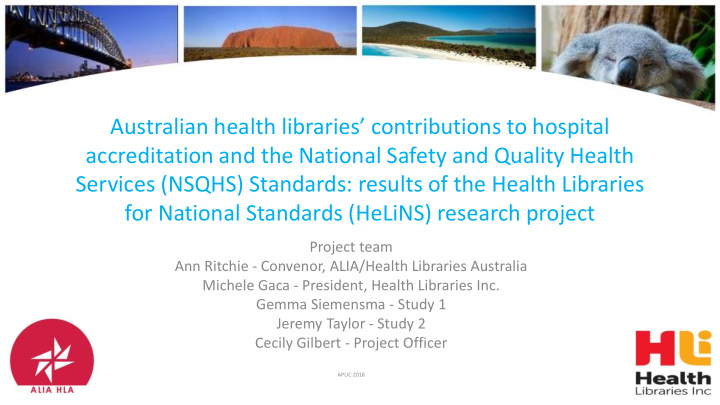



Australian health libraries’ contributions to hospital accreditation and the National Safety and Quality Health Services (NSQHS) Standards: results of the Health Libraries for National Standards (HeLiNS) research project Project team Ann Ritchie - Convenor, ALIA/Health Libraries Australia Michele Gaca - President, Health Libraries Inc. Gemma Siemensma - Study 1 Jeremy Taylor - Study 2 Cecily Gilbert - Project Officer APLIC 2018
Outline 1. What is the HeLiNS research project? 2. Results 3. Next steps
HeLiNS Health Libraries for the National Standards ALIA research grant 2016 awarded to: • Health Libraries Australia • Health Libraries Inc. Purpose: to explore and record the contribution that health libraries make to the achievement of hospital accreditation.
HeLiNS Project Team • Project Coordinators: Ann Ritchie & Michele Gaca • Study 1 Leader: Gemma Siemensma • Study 2 Leader: Jeremy Taylor • Project Officer: Cecily Gilbert National Reference Group • 13 members representing all states & territories
Objectives 1. Explore ways in which health libraries assist their organisations in achieving accreditation 2. Design expert searches that will assist organisations in keeping current with the latest research-based literature (evidence) pertinent to the NSQHS Standards 3. Assess the availability of resource materials referenced in NSQHS Standards documentation
Australian health library landscape 2016 1322 hospitals Australia-wide 1 • 698 public / 624 private • 6 states / 2 territories 328 health libraries (95 in hospitals) 2 • Metropolitan – regional – rural • Size: L, M, S 1250 health library workforce 2 1. AIHW 2015 2. ALIA HLA Census 2014
National Safety & Quality Health Services
Methods Two component studies: Study 1 – Survey of hospital library services asking how they contribute to their hospitals’ accreditation. – In-depth case studies (interviews) to explore some of the notable examples Study 2 – Assessment of availability of resource materials referenced in NSQHS Standards documentation – Designing of live literature search strategies across a range of NSQHS standards
Study 1: results • 67.37% response rate (64 of a possible 95 1 ) • All states represented • Metropolitan (63%), regional (32%), rural (5%) 1. ALIA HLA Census 2014
Study 1 Survey Responses
Activities supporting Standards Traditional library services Multiple mentions • Lit searches (n=25) • Research support • Collection management • Reference (n=20) • LibGuides • Training (n=19) • Dedicated subject guides • Doc Del (n=19) for each standard • Alerts (n=16) • Evidence summaries
8 detailed case studies Case Study Relevant Standard/s Organisation Key words Austin Health Research Online 1 Austin Health, VIC Clinical Governance, Information Services, (AHRO) Publications, Research Report Health Literacy Champions 2 Barwon Health, VIC Health Literacy, Consumer Health Information, Program Patient Participation Health Literacy in Children’s 2 Redland Hospital, QLD Consumer Health Information, Health Literacy Health Medicines Information 4 Ballarat Health Services, VIC Drug Information Services, Medication Errors, Resources - Library & Library Collection Development Pharmacy collaboration. Antimicrobials Guideline 1,4 Northern Territory Health Medication Errors, Patient Safety, Clinical Governance Search filters in the CINAHL 1, 2, 3, 4, 8, 10 Cabrini Health, VIC Databases, Bibliographic, Information Seeking and JBI databases Behavior, Information Services, Librarians Twilight Talks: engaging health 2 Toowoomba Hospital, QLD Health Literacy, Consumer Health Information consumers with public lectures Words for Wellbeing 2 Ipswich Hospital, QLD Bibliotherapy, Consumer Health Information
Study 2: Methodology Library Services were asked to indicate if the 322 resources which were referenced in the NSQHS Standards documentation were accessible to staff via the library’s collection. Population = 95 hospital libraries in Australia 1 Sample stratified proportionately within 8 states/territories by size (S,M,L) and location (metro/rural/regional): 54 libraries invited to participate 32 responded, approx = 60% RR 1 HLA Census 2014
Study 2: results 100% 90% 80% 70% 60% 50% 40% 30% 20% 10% 0% ACT NSW NT QLD SA TAS VIC WA Open Access Access No access State-wide portals provide between 25% and 80% of references Less than 50% references are available on OA (Cochrane is the only nationally subscribed resource; may be some overlap with OA data)
Comparison of models: national and state The research did not analyse: • Portal’s purpose and collection policies • Cost per clinician • Performance • Library services eg. doc del
Live Search Strategies Topics • Falls prevention • Advance care planning • Infection prevention • Blood management • Medication Safety • Clinical handover • Partnering with consumers • Delirium • Pressure injures • Deteriorating patient • Wound management
Next steps • Talking with ACSQHC to get live search strategies on their website • Develop more live search topics • Maintain live search topics into the future • Make in-depth case studies available for others to use as a peer-to-peer tool • Look at incorporating elements of version 2 of the NSQHS standards (beginning January 2019) • Disseminate results of the research widely
Conclusion • Health libraries in Australia make a substantial contribution to support their organisations in successfully achieving accreditation. • Health libraries are integral to hospital quality and safety , but it’s not a level playing field. • Hospitals without a health library may be at a disadvantage when undergoing NSQHS accreditation.
Acknowledgements The Project team thanks ALIA for the research award, HLA and HLI for contributing funds, the members of the Reference Group for their expert advice, and Sarah Hayman for leading the development of the ‘live’ tested search strategies.
Recommend
More recommend